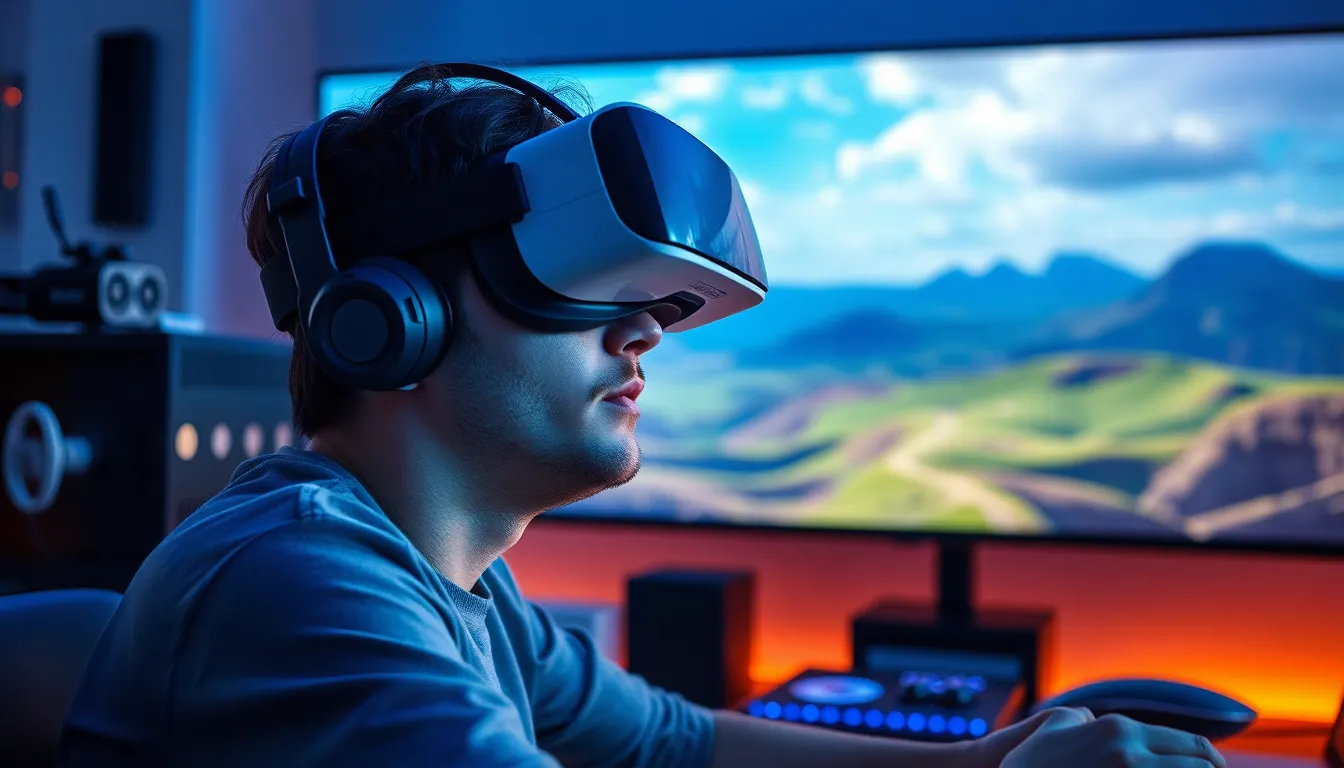Table of Contents
ToggleVirtual reality gaming is revolutionizing the way players experience their favorite titles, immersing them in worlds previously limited to imagination. With advancements in technology, VR has become more accessible, captivating gamers of all ages and skill levels. As the industry evolves, staying updated on the latest VR gaming news is essential for enthusiasts eager to explore new developments and trends.
From groundbreaking hardware releases to innovative game titles, the VR landscape is constantly changing. Developers are pushing boundaries, creating experiences that blur the lines between reality and the virtual realm. Whether it’s through enhanced graphics, new gameplay mechanics, or social connectivity, VR gaming continues to capture attention and spark excitement. Dive into the latest updates and discover what’s shaping the future of gaming in this thrilling digital frontier.
Latest Developments in VR Gaming News
Recent shifts in the VR gaming landscape highlight notable advancements in technology and immersive gameplay. Developers are launching high-profile titles that optimize the full potential of VR environments.
Hardware Innovations
- Wireless Headsets: Many manufacturers released wireless VR headsets, enhancing mobility and user comfort. Models such as the Meta Quest 3 provide increased battery life and improved frame rates.
- Ultra-High-Resolution Displays: Display technology has improved significantly, showcasing sharper graphics. Leading devices now offer resolutions exceeding 4K per eye, enhancing visual fidelity.
- Enhanced Tracking Systems: Advanced tracking capabilities enable more accurate motion detection. Solutions now integrate inside-out tracking, allowing players to engage without external sensors.
Game Releases and Updates
- Major Titles: Popular games like “Half-Life: Alyx” and “Beat Saber” received significant updates. New content packs include additional levels and user-generated content options, expanding replayability.
- Indie Games: Emerging indie titles, such as “Lone Echo II” and “Pistol Whip,” showcase innovative gameplay mechanics. These games often push creative boundaries while delivering unique experiences.
- Cross-Platform Play: Developers are increasingly implementing cross-platform capabilities. This fosters wider player communities, allowing users across different systems to interact seamlessly.
Social Connectivity Features
- Multiplayer Experiences: New VR titles emphasize social interaction through multiplayer modes. Games like “Rec Room” and “VRChat” facilitate socializing in engaging virtual spaces.
- Live Events: VR social platforms are hosting live events, such as concerts and festivals. These experiences create immersive environments for users to enjoy with friends.
- Community Engagement: Enhanced community tools are emerging in VR titles, enabling players to share experiences. Developers encourage feedback loops to foster user-centric updates.
Industry Trends
- Investment Surge: Investment in VR gaming technology continues to rise. Venture capital firms are funding innovative startups exploring unique VR applications.
- Integration with AI: Developers are incorporating AI to enhance gameplay experiences. AI-driven NPCs create dynamic interactions, increasing immersion.
- Focus on Wellness: Games promoting physical activity and mental well-being gain traction. Projects like “FitXR” and “Holofit” combine fitness with entertainment effectively.
These developments underscore the dynamic evolution of VR gaming, reflecting the industry’s commitment to advancing technology and enhancing player experiences.
Major Announcements from Industry Leaders

Recent announcements from industry leaders highlight exciting developments and upcoming products within the VR gaming landscape.
Upcoming Game Releases
Notable releases include “Ghostbusters: Rise of the Ghost Lord,” set for December 2023, offering players cooperative ghost-hunting experiences. “Resident Evil 4 VR” continues its popularity with scheduled updates enhancing gameplay and visuals. Additionally, the indie title “Zenith: The Last City” introduces major expansions, emphasizing player-driven narratives and extensive world-building. These upcoming titles maintain anticipation and showcase innovative gameplay mechanics.
Hardware Innovations
Significant hardware advancements raise the bar for VR experiences. The Meta Quest 3 features improvements like ultra-high-resolution displays, providing gamers with stunning visuals. Sony’s PlayStation VR2 offers enhanced haptic feedback and eye-tracking technology, further immersing players in virtual worlds. Additionally, the collaboration between hardware manufacturers and game developers results in improved compatibility, ensuring seamless experiences across devices. These innovations reinforce the commitment to elevating user engagement and functionality within VR gaming.
VR Gaming Trends to Watch
Observing trends in VR gaming provides insights into the future of interactive entertainment. These trends reflect the industry’s commitment to innovation and user engagement.
Popular Genres in VR
Identifying popular genres reveals diverse experiences that attract gamers.
- Action and Adventure: Titles like “Half-Life: Alyx” and “Boneworks” enhance immersion through dynamic narratives and engaging gameplay.
- Horror: Games such as “Resident Evil 7” and “Phasmophobia” leverage psychological elements to create intense experiences that resonate with players.
- Simulation: Projects like “Microsoft Flight Simulator” and “Job Simulator” allow users to engage in realistic scenarios, appealing to enthusiasts and casual gamers alike.
- Fitness: Titles such as “Beat Saber” and “FitXR” combine gaming with physical activity, promoting health and wellness while ensuring fun.
Evolving Technology
Evolving technology shapes the VR gaming landscape significantly.
- Headset Advancements: Devices like the Meta Quest 3 and PlayStation VR2 incorporate ultra-high-resolution displays, enhancing visual fidelity.
- Tracking Improvements: Enhanced tracking systems, including inside-out tracking, improve player movement accuracy and freedom.
- AI Integration: The incorporation of AI enhances gameplay dynamics, offering tailored experiences that react to player behavior.
- Cloud Gaming: Emerging cloud platforms allow players to access high-fidelity VR games without expensive hardware, broadening accessibility and participation.
These trends illustrate the ongoing evolution of VR gaming, highlighting the industry’s technological progress and creativity while fostering engaging experiences for players.
Impact of VR on Gaming Community
VR technology significantly alters how gamers interact and engage within their communities. VR fosters immersive experiences that enhance player collaboration and camaraderie through multiplayer gameplay. By connecting players in virtual spaces, VR gaming creates a sense of presence that traditional gaming often lacks.
VR gaming communities benefit from live events and social platforms that allow players to share experiences. Communities can host virtual meetups, tournaments, and game nights, promoting social interaction. Platforms like VRChat demonstrate how users can create, socialize, and collaborate in shared virtual environments.
Game developers recognize the importance of community engagement. Popular titles integrate social features that encourage teamwork and communication. For example, games like “Rec Room” and “Echo VR” enable players to form groups, complete challenges, and participate in competitions, reinforcing the sense of belonging.
Investment in VR technology drives community growth. Increased funding supports the development of more diverse VR titles and experiences, appealing to various player interests. As the selection of games expands, so does the opportunity for gamers to connect over shared interests.
Trends in VR gaming indicate a rise in wellness-oriented titles. Games promoting physical activity and mental well-being cater to health-conscious gamers. Titles focusing on fitness, such as “Beat Saber,” motivate players while fostering a supportive community dedicated to well-being.
The evolution of VR also impacts content creation within gaming communities. Streamers and content creators share their VR experiences on platforms like Twitch and YouTube, bringing attention to VR gaming and attracting new players. This cycle continuously enhances community engagement and attracts a broader audience.
The VR gaming landscape continues to evolve at a rapid pace. With each technological advancement and innovative title, players find themselves immersed in richer experiences. The growing focus on social connectivity and community engagement highlights the importance of collaboration and interaction in virtual environments.
As developers push the boundaries of what’s possible, gamers can look forward to exciting new releases and enhanced gameplay mechanics. The commitment to improving user experience through hardware innovations ensures that VR gaming remains a dynamic and engaging field. Staying updated on these developments is essential for anyone passionate about the future of gaming. With endless possibilities on the horizon, the journey into virtual reality is just beginning.







